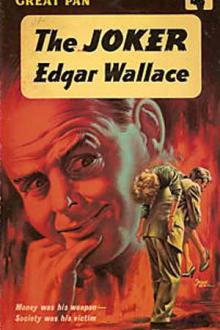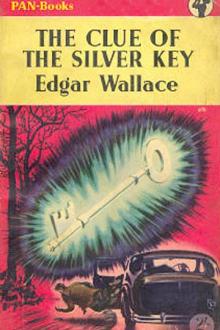author - "Edgar Wallace"

latitudes, if the truth be told, but at some time in the history of revolution, some long dead genius had coined them, and newly fashioned in the furnace of his soul they had shaped men's minds and directed their great and dreadful deeds.
So the Woman of Gratz arrived, and they talked about her and circulated her speeches in every language. And she grew. The hollow face of this lank girl filled, and the flat bosom rounded and there came softer lines and curves to her angular figure, and, almost before they realized the fact, she was beautiful.
So her fame had grown until her father died and she went to Russia. Then came a series of outrages which may be categorically and briefly set forth:--
1: General Maloff shot dead by an unknown woman in his private room at the Police Bureau, Moscow.
2: Prince Hazallarkoff shot dead by an unknown woman in the streets of Petrograd.
3: Colonel Kaverdavskov killed by a bomb thrown by a woman who made her escape.
And the Woman of Grat

u had millions what would you do? Retire, of course. Build or buy a beautiful house--and then?'
'I don't know,' said the older man vaguely. 'One could travel... '
'The English people have two ideas of happiness: one comes from travel, one from staying still! Rushing or rusting! I might marry but I don't wish to marry. I might have a great stable of race-horses, but I detest racing. I might yacht--I loathe the sea. Suppose I want a thrill? I do! The art of living is the art of victory. Make a note of that. Where is happiness in cards, horses, golf, women-anything you like? I'll tell you: in beating the best man to it! That's An Americanism. Where is the joy of mountain climbing, of exploration, of scientific discovery? To do better than somebody else--to go farther, to put your foot on the head of the next best.'
He blew a cloud of smoke through the open window and waited until the breeze had torn the misty gossamer into shreds and nothingness.
'When you're a millionaire you either

as impassive. But for the periodical puffs of smoke which came from his big briar pipe he might have been a statue carved out of red brick.
'Hey!'
Reluctantly Tickler turned. He had been quick to identify the silent watcher. By straightening his shoulders and adding something of jauntiness to his stride he hoped to prevent the recognition from becoming mutual.
Surefoot Smith was one of the few people in the world who have minds like a well-organized card index. Not the smallest and least important offender who had passed through his hands could hope to reach a blissful oblivion.
'Come here--you.'
Tickler came.
'What are you doing now, Tickler? Burglary, or just fetching the beer for the con. men? Two a.m.! Got a home?'
'Yes, sir.'
'Ah, somewhere in the West End! Gone scientific, maybe. Science is the ruin of the country!'
Rights or no rights, he passed his hands swiftly over Tickler's person; the little man stretched out his arms obediently and sm

sort of thing?" he asked. "Just say the word, if they give you trouble or cheek, and I'll have them kicked out whoever they are, from the manager downwards."
"Oh, thank you," she said hurriedly, "everybody is most polite and nice." She held out her hand. "I am afraid I must go now. A--a friend is waiting for me."
"One minute, Miss White." He licked his lips, and there was an unaccustomed embarrassment in his manner. "Maybe you'll come along one night after the show and have a little supper. You know I'm very keen on you and all that sort of thing."
"I know you're very keen on me and all that sort of thing," said Maisie White, a note of irony in her voice, "but unfortunately I'm not very keen on supper and all that sort of thing."
She smiled and again held out her hand.
"I'll say good night now."
"Do you know, Maisie----" he began.
"Good night," she said and brushed past him.
He looked after her as she disappeared into the darkness, a little frown gather

ulled up at the kerb.
The driver leant over the shining apron which partially protected him from the weather, and shouted:
"Is Miss Beale there?"
The girl started in surprise, taking a step toward the cab.
"I am Miss Beale," she said.
"Your editor has sent me for you," said the man briskly.
The editor of the Megaphone had been guilty of many eccentric acts. He had expressed views on her drawing which she shivered to recall. He had aroused her in the middle of the night to sketch dresses at a fancy dress ball, but never before had he done anything so human as to send a taxi for her. Nevertheless, she would not look at the gift cab too closely, and she stepped into the warm interior.
The windows were veiled with the snow and the sleet which had been falling all the time she had been in the theatre. She saw blurred lights flash past, and realised that the taxi was going at a good pace. She rubbed the windows and tried to look out after a while. Then she e

latitudes, if the truth be told, but at some time in the history of revolution, some long dead genius had coined them, and newly fashioned in the furnace of his soul they had shaped men's minds and directed their great and dreadful deeds.
So the Woman of Gratz arrived, and they talked about her and circulated her speeches in every language. And she grew. The hollow face of this lank girl filled, and the flat bosom rounded and there came softer lines and curves to her angular figure, and, almost before they realized the fact, she was beautiful.
So her fame had grown until her father died and she went to Russia. Then came a series of outrages which may be categorically and briefly set forth:--
1: General Maloff shot dead by an unknown woman in his private room at the Police Bureau, Moscow.
2: Prince Hazallarkoff shot dead by an unknown woman in the streets of Petrograd.
3: Colonel Kaverdavskov killed by a bomb thrown by a woman who made her escape.
And the Woman of Grat

u had millions what would you do? Retire, of course. Build or buy a beautiful house--and then?'
'I don't know,' said the older man vaguely. 'One could travel... '
'The English people have two ideas of happiness: one comes from travel, one from staying still! Rushing or rusting! I might marry but I don't wish to marry. I might have a great stable of race-horses, but I detest racing. I might yacht--I loathe the sea. Suppose I want a thrill? I do! The art of living is the art of victory. Make a note of that. Where is happiness in cards, horses, golf, women-anything you like? I'll tell you: in beating the best man to it! That's An Americanism. Where is the joy of mountain climbing, of exploration, of scientific discovery? To do better than somebody else--to go farther, to put your foot on the head of the next best.'
He blew a cloud of smoke through the open window and waited until the breeze had torn the misty gossamer into shreds and nothingness.
'When you're a millionaire you either

as impassive. But for the periodical puffs of smoke which came from his big briar pipe he might have been a statue carved out of red brick.
'Hey!'
Reluctantly Tickler turned. He had been quick to identify the silent watcher. By straightening his shoulders and adding something of jauntiness to his stride he hoped to prevent the recognition from becoming mutual.
Surefoot Smith was one of the few people in the world who have minds like a well-organized card index. Not the smallest and least important offender who had passed through his hands could hope to reach a blissful oblivion.
'Come here--you.'
Tickler came.
'What are you doing now, Tickler? Burglary, or just fetching the beer for the con. men? Two a.m.! Got a home?'
'Yes, sir.'
'Ah, somewhere in the West End! Gone scientific, maybe. Science is the ruin of the country!'
Rights or no rights, he passed his hands swiftly over Tickler's person; the little man stretched out his arms obediently and sm

sort of thing?" he asked. "Just say the word, if they give you trouble or cheek, and I'll have them kicked out whoever they are, from the manager downwards."
"Oh, thank you," she said hurriedly, "everybody is most polite and nice." She held out her hand. "I am afraid I must go now. A--a friend is waiting for me."
"One minute, Miss White." He licked his lips, and there was an unaccustomed embarrassment in his manner. "Maybe you'll come along one night after the show and have a little supper. You know I'm very keen on you and all that sort of thing."
"I know you're very keen on me and all that sort of thing," said Maisie White, a note of irony in her voice, "but unfortunately I'm not very keen on supper and all that sort of thing."
She smiled and again held out her hand.
"I'll say good night now."
"Do you know, Maisie----" he began.
"Good night," she said and brushed past him.
He looked after her as she disappeared into the darkness, a little frown gather

ulled up at the kerb.
The driver leant over the shining apron which partially protected him from the weather, and shouted:
"Is Miss Beale there?"
The girl started in surprise, taking a step toward the cab.
"I am Miss Beale," she said.
"Your editor has sent me for you," said the man briskly.
The editor of the Megaphone had been guilty of many eccentric acts. He had expressed views on her drawing which she shivered to recall. He had aroused her in the middle of the night to sketch dresses at a fancy dress ball, but never before had he done anything so human as to send a taxi for her. Nevertheless, she would not look at the gift cab too closely, and she stepped into the warm interior.
The windows were veiled with the snow and the sleet which had been falling all the time she had been in the theatre. She saw blurred lights flash past, and realised that the taxi was going at a good pace. She rubbed the windows and tried to look out after a while. Then she e




